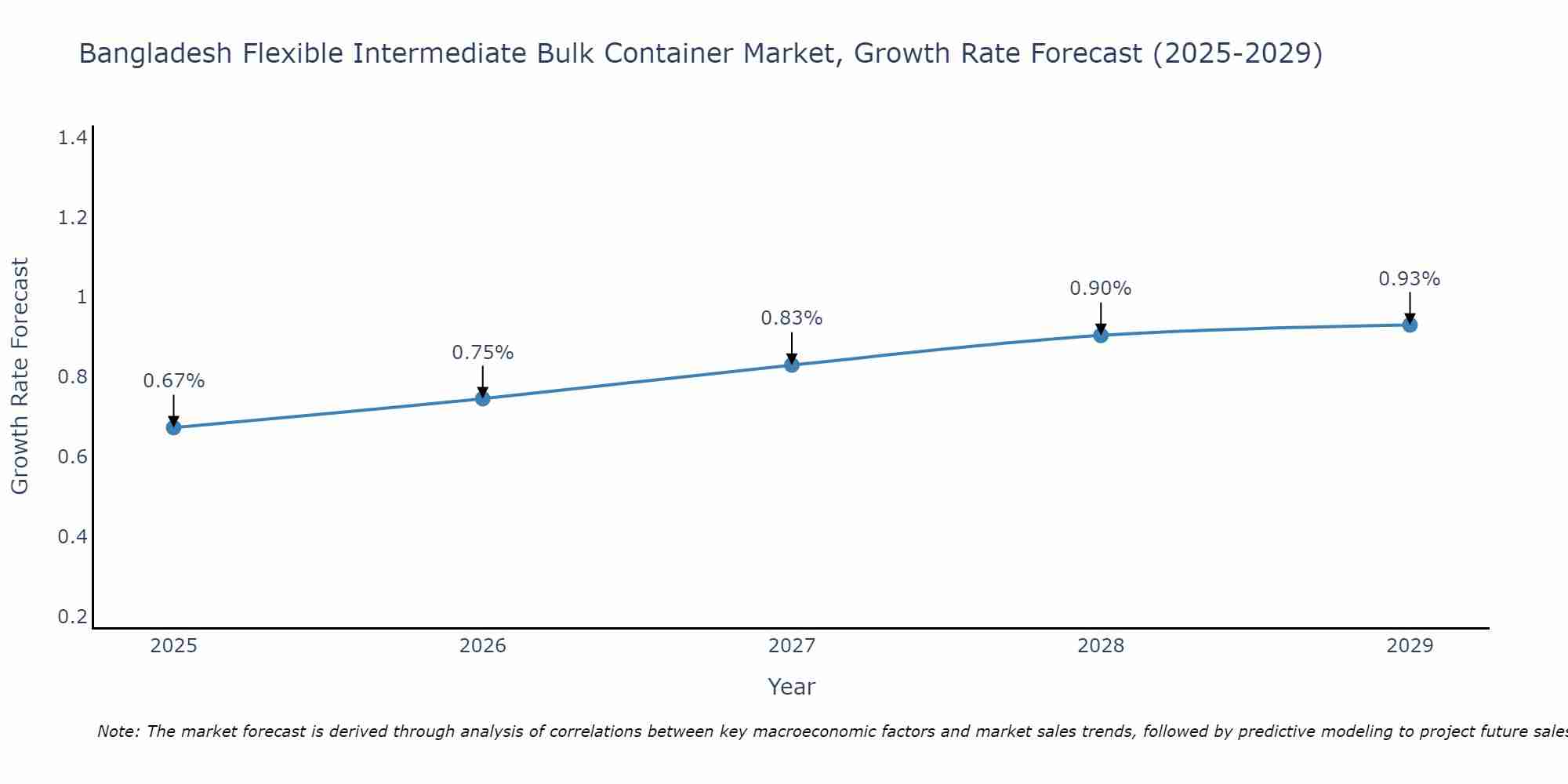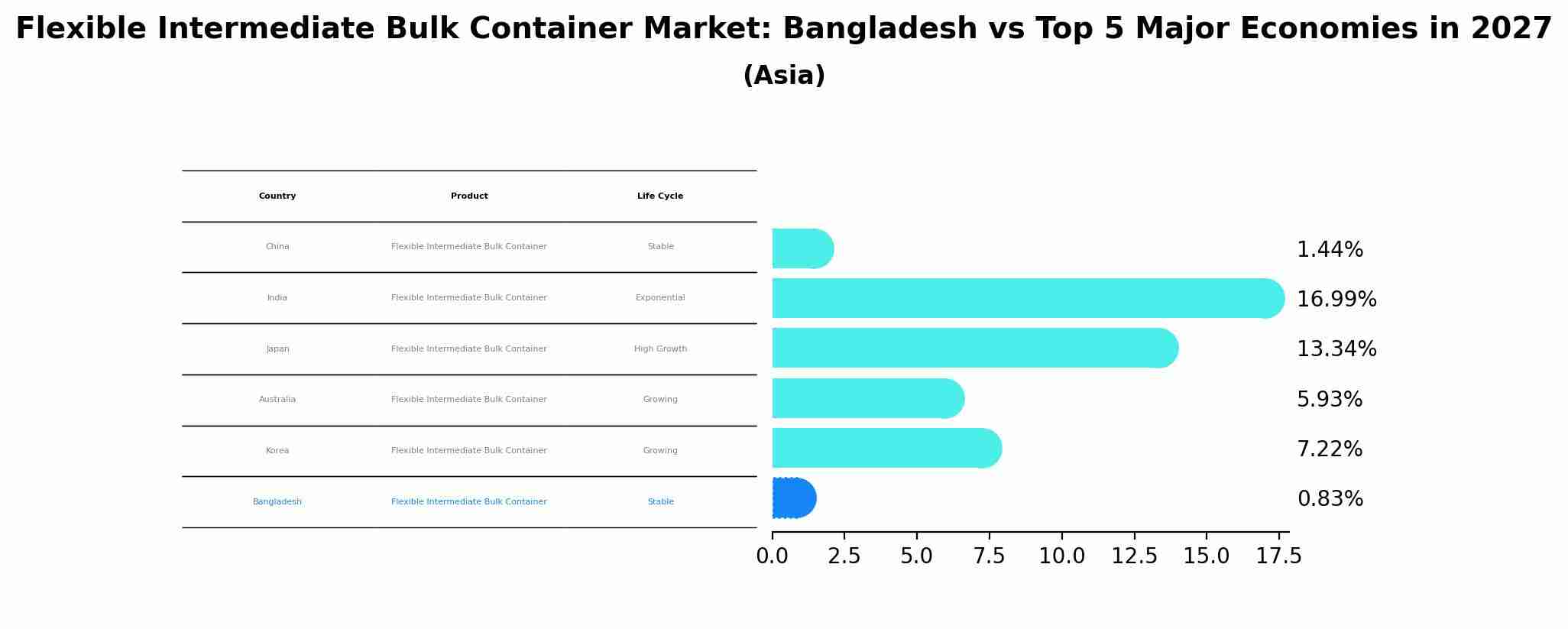Bangladesh Flexible Intermediate Bulk Container Market (2025-2031) Outlook | Revenue, Analysis, Size, Growth, Trends, Companies, Industry, Forecast, Value & Share
| Product Code: ETC373892 | Publication Date: Aug 2022 | Updated Date: Jul 2025 | Product Type: Market Research Report | |
| Publisher: 6Wresearch | Author: Ravi Bhandari | No. of Pages: 75 | No. of Figures: 35 | No. of Tables: 20 |
Bangladesh Flexible Intermediate Bulk Container Market Size Growth Rate
The Bangladesh Flexible Intermediate Bulk Container Market is likely to experience consistent growth rate gains over the period 2025 to 2029. Commencing at 0.67% in 2025, growth builds up to 0.93% by 2029.

Flexible Intermediate Bulk Container Market: Bangladesh vs Top 5 Major Economies in 2027 (Asia)
Bangladesh's Flexible Intermediate Bulk Container market is anticipated to experience a stable growth rate of 0.83% by 2027, reflecting trends observed in the largest economy China, followed by India, Japan, Australia and South Korea.

Bangladesh Flexible Intermediate Bulk Container Market Synopsis
The Bangladesh Flexible Intermediate Bulk Container (FIBC) market is experiencing steady growth due to the country`s expanding industrial sector and increasing demand for efficient bulk packaging solutions. FIBCs are widely used in various industries such as agriculture, chemicals, pharmaceuticals, and construction for transporting and storing bulk goods. The market is driven by factors such as cost-effectiveness, ease of handling, and environmental sustainability. Key players in the Bangladesh FIBC market are focusing on product innovations, customization, and sustainable practices to gain a competitive edge. Additionally, government initiatives to promote sustainable packaging solutions are further boosting market growth. Overall, the Bangladesh FIBC market is poised for continued expansion in the coming years as industries increasingly adopt FIBCs for their bulk packaging needs.
Bangladesh Flexible Intermediate Bulk Container Market Trends
The Bangladesh Flexible Intermediate Bulk Container (FIBC) market is experiencing significant growth due to various factors, including the increasing demand for efficient and cost-effective bulk packaging solutions across industries such as agriculture, chemicals, and pharmaceuticals. The market is witnessing a shift towards sustainable and reusable FIBCs to reduce environmental impact and operational costs. Additionally, advancements in FIBC technology, such as the development of anti-static, food-grade, and breathable FIBCs, are gaining traction in the market. The growing awareness about the benefits of FIBCs in terms of transportation efficiency and storage convenience is further driving market expansion. Overall, the Bangladesh FIBC market is projected to continue its growth trajectory, driven by the increasing adoption of FIBCs in diverse sectors and the emphasis on sustainability and innovation in packaging solutions.
Bangladesh Flexible Intermediate Bulk Container Market Challenges
In the Bangladesh Flexible Intermediate Bulk Container (FIBC) market, some key challenges include quality control issues due to varying standards among manufacturers, lack of awareness about the benefits of FIBCs compared to traditional packaging options, and competition from other types of bulk packaging solutions. Additionally, inadequate infrastructure for transportation and storage of FIBCs, along with limited availability of raw materials locally, can pose logistical challenges for companies operating in this market. Furthermore, fluctuating raw material prices and currency exchange rates can impact production costs and pricing strategies for FIBC manufacturers in Bangladesh. Overcoming these challenges will require investments in quality control measures, increased market education efforts, improvements in logistics infrastructure, and strategic partnerships to ensure a competitive edge in the FIBC market.
Bangladesh Flexible Intermediate Bulk Container Market Investment Opportunities
The Bangladesh Flexible Intermediate Bulk Container (FIBC) market presents promising investment opportunities due to the country`s growing export-oriented industries such as textiles, agriculture, and pharmaceuticals, which require efficient and cost-effective packaging solutions. With the increasing focus on sustainability and bulk transportation needs, the demand for FIBCs is expected to rise. Investing in FIBC manufacturing companies or establishing a production facility in Bangladesh can be lucrative, leveraging the country`s competitive labor costs and strategic location for exports. Additionally, there is potential for innovation and customization in FIBC design to cater to specific industry needs and regulations. Collaborating with local distributors and industry players can also provide insights and opportunities for market penetration and growth in the Bangladesh FIBC market.
Jordan Agar Market Government Policies
Government policies related to the Bangladesh Flexible Intermediate Bulk Container (FIBC) market primarily focus on promoting the use of environmentally friendly and recyclable materials in FIBC production. The government has implemented regulations to ensure compliance with international quality standards, particularly in terms of safety and durability. Additionally, there are incentives in place to encourage local manufacturing of FIBCs, supporting the growth of the domestic industry and reducing reliance on imports. Import duties and tariffs on FIBCs have been adjusted to protect local manufacturers and promote a level playing field. Overall, the government`s policies aim to enhance the sustainability and competitiveness of the Bangladesh FIBC market while fostering a favorable business environment for both local producers and international players.
Bangladesh Flexible Intermediate Bulk Container Market Future Outlook
The Bangladesh Flexible Intermediate Bulk Container (FIBC) market is expected to witness significant growth in the coming years due to factors such as increasing demand from industries like agriculture, chemicals, and pharmaceuticals. The market is likely to benefit from the country`s expanding industrial sector, growing export-oriented industries, and the government`s focus on infrastructure development. Additionally, the rising popularity of FIBCs as a cost-effective and eco-friendly packaging solution is expected to drive market growth. However, challenges such as fluctuating raw material prices and competition from alternative packaging solutions may impact market growth to some extent. Overall, the Bangladesh FIBC market is poised for expansion in the foreseeable future, presenting opportunities for manufacturers and suppliers to capitalize on the growing demand.
Key Highlights of the Report:
- Bangladesh Flexible Intermediate Bulk Container Market Outlook
- Market Size of Bangladesh Flexible Intermediate Bulk Container Market, 2024
- Forecast of Bangladesh Flexible Intermediate Bulk Container Market, 2031
- Historical Data and Forecast of Bangladesh Flexible Intermediate Bulk Container Revenues & Volume for the Period 2021 - 2031
- Bangladesh Flexible Intermediate Bulk Container Market Trend Evolution
- Bangladesh Flexible Intermediate Bulk Container Market Drivers and Challenges
- Bangladesh Flexible Intermediate Bulk Container Price Trends
- Bangladesh Flexible Intermediate Bulk Container Porter's Five Forces
- Bangladesh Flexible Intermediate Bulk Container Industry Life Cycle
- Historical Data and Forecast of Bangladesh Flexible Intermediate Bulk Container Market Revenues & Volume By Product for the Period 2021 - 2031
- Historical Data and Forecast of Bangladesh Flexible Intermediate Bulk Container Market Revenues & Volume By Type A for the Period 2021 - 2031
- Historical Data and Forecast of Bangladesh Flexible Intermediate Bulk Container Market Revenues & Volume By Type B for the Period 2021 - 2031
- Historical Data and Forecast of Bangladesh Flexible Intermediate Bulk Container Market Revenues & Volume By Type C for the Period 2021 - 2031
- Historical Data and Forecast of Bangladesh Flexible Intermediate Bulk Container Market Revenues & Volume By Type D for the Period 2021 - 2031
- Historical Data and Forecast of Bangladesh Flexible Intermediate Bulk Container Market Revenues & Volume By End-Use for the Period 2021 - 2031
- Historical Data and Forecast of Bangladesh Flexible Intermediate Bulk Container Market Revenues & Volume By Food for the Period 2021 - 2031
- Historical Data and Forecast of Bangladesh Flexible Intermediate Bulk Container Market Revenues & Volume By Chemical for the Period 2021 - 2031
- Historical Data and Forecast of Bangladesh Flexible Intermediate Bulk Container Market Revenues & Volume By Pharmaceuticals for the Period 2021 - 2031
- Historical Data and Forecast of Bangladesh Flexible Intermediate Bulk Container Market Revenues & Volume By Others for the Period 2021 - 2031
- Bangladesh Flexible Intermediate Bulk Container Import Export Trade Statistics
- Market Opportunity Assessment By Product
- Market Opportunity Assessment By End-Use
- Bangladesh Flexible Intermediate Bulk Container Top Companies Market Share
- Bangladesh Flexible Intermediate Bulk Container Competitive Benchmarking By Technical and Operational Parameters
- Bangladesh Flexible Intermediate Bulk Container Company Profiles
- Bangladesh Flexible Intermediate Bulk Container Key Strategic Recommendations
Frequently Asked Questions About the Market Study (FAQs):
Export potential assessment - trade Analytics for 2030
Export potential enables firms to identify high-growth global markets with greater confidence by combining advanced trade intelligence with a structured quantitative methodology. The framework analyzes emerging demand trends and country-level import patterns while integrating macroeconomic and trade datasets such as GDP and population forecasts, bilateral import–export flows, tariff structures, elasticity differentials between developed and developing economies, geographic distance, and import demand projections. Using weighted trade values from 2020–2024 as the base period to project country-to-country export potential for 2030, these inputs are operationalized through calculated drivers such as gravity model parameters, tariff impact factors, and projected GDP per-capita growth. Through an analysis of hidden potentials, demand hotspots, and market conditions that are most favorable to success, this method enables firms to focus on target countries, maximize returns, and global expansion with data, backed by accuracy.
By factoring in the projected importer demand gap that is currently unmet and could be potential opportunity, it identifies the potential for the Exporter (Country) among 190 countries, against the general trade analysis, which identifies the biggest importer or exporter.
To discover high-growth global markets and optimize your business strategy:
Click Here- Single User License$ 1,995
- Department License$ 2,400
- Site License$ 3,120
- Global License$ 3,795
Search
Thought Leadership and Analyst Meet
Our Clients
Related Reports
- India Switchgear Market Outlook (2026 - 2032) | Size, Share, Trends, Growth, Revenue, Forecast, Analysis, Value, Outlook
- Pakistan Contraceptive Implants Market (2025-2031) | Demand, Growth, Size, Share, Industry, Pricing Analysis, Competitive, Strategic Insights, Strategy, Consumer Insights, Analysis, Investment Trends, Opportunities, Revenue, Segments, Value, Segmentation, Supply, Forecast, Restraints, Outlook, Competition, Drivers, Trends, Companies, Challenges
- Sri Lanka Packaging Market (2026-2032) | Outlook, Competition, Drivers, Trends, Demand, Pricing Analysis, Competitive, Strategic Insights, Companies, Challenges, Strategy, Consumer Insights, Analysis, Investment Trends, Opportunities, Growth, Size, Share, Industry, Revenue, Segments, Value, Segmentation, Supply, Forecast, Restraints
- India Kids Watches Market (2026-2032) | Strategy, Consumer Insights, Analysis, Investment Trends, Opportunities, Growth, Size, Share, Industry, Revenue, Segments, Value, Segmentation, Supply, Forecast, Restraints, Outlook, Competition, Drivers, Trends, Demand, Pricing Analysis, Competitive, Strategic Insights, Companies, Challenges
- Saudi Arabia Core Assurance Service Market (2025-2031) | Strategy, Consumer Insights, Analysis, Investment Trends, Opportunities, Growth, Size, Share, Industry, Revenue, Segments, Value, Segmentation, Supply, Forecast, Restraints, Outlook, Competition, Drivers, Trends, Demand, Pricing Analysis, Competitive, Strategic Insights, Companies, Challenges
- Romania Uninterruptible Power Supply (UPS) Market (2026-2032) | Industry, Analysis, Revenue, Size, Forecast, Outlook, Value, Trends, Share, Growth & Companies
- Saudi Arabia Car Window Tinting Film, Paint Protection Film (PPF), and Ceramic Coating Market (2025-2031) | Strategy, Consumer Insights, Analysis, Investment Trends, Opportunities, Growth, Size, Share, Industry, Revenue, Segments, Value, Segmentation, Supply, Forecast, Restraints, Outlook, Competition, Drivers, Trends, Demand, Pricing Analysis, Competitive, Strategic Insights, Companies, Challenges
- South Africa Stationery Market (2025-2031) | Share, Size, Industry, Value, Growth, Revenue, Analysis, Trends, Segmentation & Outlook
- Afghanistan Rocking Chairs And Adirondack Chairs Market (2026-2032) | Size & Revenue, Competitive Landscape, Share, Segmentation, Industry, Value, Outlook, Analysis, Trends, Growth, Forecast, Companies
- Afghanistan Apparel Market (2026-2032) | Growth, Outlook, Industry, Segmentation, Forecast, Size, Companies, Trends, Value, Share, Analysis & Revenue
Industry Events and Analyst Meet
Whitepaper
- Middle East & Africa Commercial Security Market Click here to view more.
- Middle East & Africa Fire Safety Systems & Equipment Market Click here to view more.
- GCC Drone Market Click here to view more.
- Middle East Lighting Fixture Market Click here to view more.
- GCC Physical & Perimeter Security Market Click here to view more.
6WResearch In News
- Doha a strategic location for EV manufacturing hub: IPA Qatar
- Demand for luxury TVs surging in the GCC, says Samsung
- Empowering Growth: The Thriving Journey of Bangladesh’s Cable Industry
- Demand for luxury TVs surging in the GCC, says Samsung
- Video call with a traditional healer? Once unthinkable, it’s now common in South Africa
- Intelligent Buildings To Smooth GCC’s Path To Net Zero


















